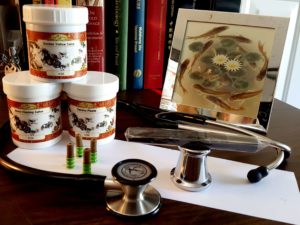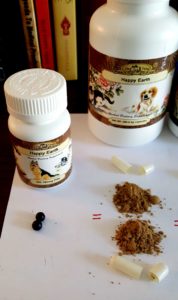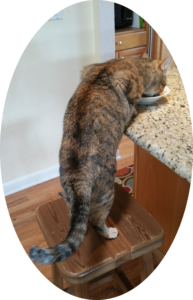How to Give Traditional Chinese Herbal Medicine to Your Dog or Cat
Tru Tips for Giving Traditional Chinese Herbal Medicine
Introduction to Traditional Chinese Veterinary Herbal Medicine
Traditional Chinese Veterinary Medicine (TCVM) has been practiced routinely in China for more than 2,000 years. TCVM incorporates food therapy, tui na (sometimes also called an mo) physical manipulation therapy, acupuncture and Chinese Herbal Medicine (CHM). Traditionally, the majority of the medicine was food therapy, About 70% of patients in China are treated with Chinese herbs or a combination of herbs and acupuncture. Only about 30% of patients are treated with acupuncture alone. Many clinical studies have found that Chinese Herbal Medicine is extremely effective for treating medical disorders in a wide variety of areas including cardiology, dermatology, endocrinology, gastroenterology, reproduction, oncology, behavior, respiratory problems, and sports medicine.
How are the Chinese Herbal Formulas Special?
Chinese herbal medicine formulas use whole herbs combined into formulas with usually one to ten or more ingredients. These components are chosen to synergize the healing effects and minimize potential side effects. Studies in the past thirty years have shown that the formulas are far more effective with less side effects than single herbs or Western formulas that have not been tested in their final form. With Chinese Herbal Medicine, you should see results for an acute external condition (like “garbage gut” or a urinary tract infection, for example) within one day to four weeks. Chronic problems may take one week to six months to see results. Older pets or immunocompromised pets may need some level of lifetime maintenance therapy.
What are Side Effects of Chinese Herbal Medicines?
Herbs are drugs and as such, can be very potent. Chinese herbals can cause problems if they are abused or inappropriately prescribed. Used properly, Chinese Herbal Medicine has remarkably few side effects. Five percent of pets may experience stomach upset with diarrhea or vomiting. Strong pets with Excess conditions need to be monitored by the TCVM doctor to ensure we do not add to the excess. Weak pets with deficiencies often need check-ups to identify new or emerging patterns and adjust the treatments accordingly. In general, Chinese Herbal Medicine can be used safely with Western pharmaceuticals. Patients that are on Western Cardiac drugs, diuretics, anti-diabetic drugs, anti-hypertensive medications and blood thinners should be monitored carefully when using herbs that have similar actions.
How Safe and Pure are Chinese Herbal Medicines?
Dr Truli only prescribes top quality herbs from Jing Tang Herbal in Reddick, Florida, United States. The herbs have been independently tested for heavy metals, pesticide residue, moisture and bacteria. They are tested to ensure identity, purity, strength & composition and the traceability of all ingredients and components used in each batch. No endangered species are used in the formulations. No banned substances like ephedra will be found in these herbals.
While acupuncture usually can only help a pet because it encourages homeostatic balance, you can hurt your pet with herbal medicine. Let me explain a little bit: for example, Stomach-36 is an acupuncture point below the knee that can increase digestive acids in a pet with weak digestion or decrease stomach acids in a pet with stomach ulcers. Governing Vessel-1 will fix constipation or diarrhea. The same acupuncture point will slow what is too fast and speed up what is too slow. It just knows.
Herbal medicines are not like this. They “push” in a certain direction. They may be warming or cooling, for example. So if a dog takes an “arthritis remedy” herbal, did the dog have heat-responsive arthritis or cold-responsive arthritis? That’s right, for those of you in America who may not have heard of this, there are types of arthritis that feel better with cold. If your dog has that arthritis, the herbal medicine will not only not work, it may make your pet feel worse. (You may feel like you “tried everything” and nothing helps your pet.) I strongly urge you to find a veterinarian confident and trained in herbal medicine and in proper detailed diagnosis in order to have the best treatment outcomes.
What Forms Do Chinese Herbal Medicines for Pets Come In?
- Teapills
- Patent Pills
- 0.2g Capsules
- 0.5g Capsules
- 0.5g Concentrated Capsules
- Loose Powder
- Concentrated Powder
- Topical Salve
- Essential Oils of Traditional Chinese Herbs
What Are Possible Chinese Herbal Medicine Routes of Administration?
- Oral
- with or without food
- cooked or raw
- in liquid or solids
- cooked into biscuits or treats
- Topical
- Rectal (last resort- please consult your holistic vet before trying this!)
- Moxabustion
- Soak Into Paw Pads (unknown how strong this treatment is compared to others)
- Aromatherapy (experimental)
How Do I Give the Chinese Herbal Medicines to My Dog?
Chinese Herbal Medicines are administered orally for most pets. Capsules may be opened and sprinkled in food or fed whole. Most Chinese Herbal Medicines may be added to food when it is cooking or mixed in food after cooking. (Doc Truli will let you know if the herbal formula for your pet is too fragile for cooking.) Most Chinese Herbal Medicines may be baked into dog biscuits. (Jing Tang Herbal offers dog biscuits for the most commonly ordered formulas including External Wind™, Body Sore™, Damp Heat Skin™, and others.)
Teapills may be crushed and hidden in food. The Teapills may also be melted in a small amount of water or edible liquid like tuna juice or chicken broth and administered orally via dropper, tuberculin syringe, or oral dosing syringe.
Tru Tip
“I knew a Welsh Terrier that preferred her Teapills in an olive that had the pimento removed. In her case, the olive was also appropriate food therapy for her condition,” says Doc Truli”
Powdered herbs may be mixed with food, treats or liquid and administered orally.
How Do I Give the Chinese Herbal Medicines to My Cat?
Chinese Herbal Medicines are administered orally for most cats. Capsules may be opened and sprinkled in food or fed whole. The Chinese Herbal Medicines may be adding to food when it is cooking or mixed in food after cooking. Chinese Herbal Medicines may be baked into treats.
Teapills may be crushed and hidden in food. The Teapills may also be melted in a small amount of water and administered orally via dropper, tuberculin syringe, or oral dosing syringe. Teapills may also be inserted into something yummy. Some cats like chicken hearts and will not criticize a Teapill for hiding in there!
Tru Tip
“If you are going to melt the Teapill in water, use only 1-2 teaspoons of water. If you melt the Teapill in a larger volume of water, you will have to administer a much larger amount of liquid to a pet who already resists the process,” says Doc Truli.
Powdered herbs may be mixed with food, treats or liquid and administered orally.
Cats will also accept herbal medicines mixed in something they have to lick or clean off of their paws. Consult with your holistic veterinarian before you try this, because there may be reasons this would be unhealthy for your cat. Many of my cat patients get their herbs in Coconut oil smeared on their paw. They want that paw clean, so they lick off the coconut oil and the herbs.
Another trick that has worked is to sprinkle the powder on their fur. A cat that likes to clean itself will lick the powder off while grooming and see benefits to the treatment. Do not try this on a cat that is too sick or disinterested in grooming themselves. Do not try it on open wounds, sore skin, or allergic pets. Some herbs stain furniture and fabrics, carpets and bed linens. Be aware.
All *tricks* for giving Chinese Herbal Remedies to cats and dogs are suggestions for you to discuss with your holistic veterinarian. To avoid a mishap, side effect or other health or sanitation problems and to assess the effect of the treatment on bystander pets, please consult with your trusted local holistic veterinarian.
Resources for further study:
Chinese Herbal Medicines: From Historical Legends to Medical Practice by Xiaolin Deng, OMD & Aituan Ma, MS, PhD, Chi Institute Press, 2016. This book of stories helps the herbs and their uses “stick” in your mind. Not a textbook. Not a treatment guide.
The Divine Farmer’s Materia Medica (Shen Nong Ben Cao Jing) translation by Yang Shou-zhong, Blue Poppy Press, 1998.







My dog is on theopholine for his collapsed trechea.. I was looking at the body sore for his artheric pain .. can these two be taken together..
Kathy
Dear Kathy,
That is a perfect question for the vet who prescribed the Body Sore. Body Sore availability is limited to veterinarians who should be able to answer your questions like drug interactions or receive a consult with the master herbalist and receive the answer they need. Your veterinarian is a wonderful resource who you should feel you can turn to with a very good question like the one you just asked.
Sincerely,
Doc Truli